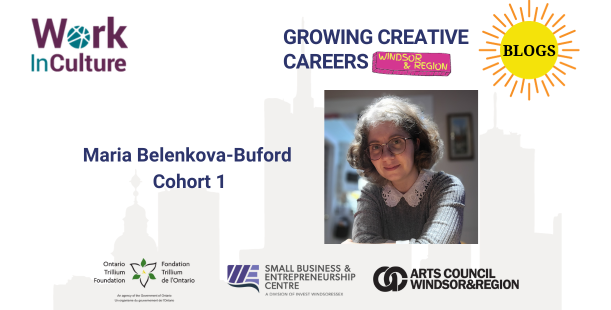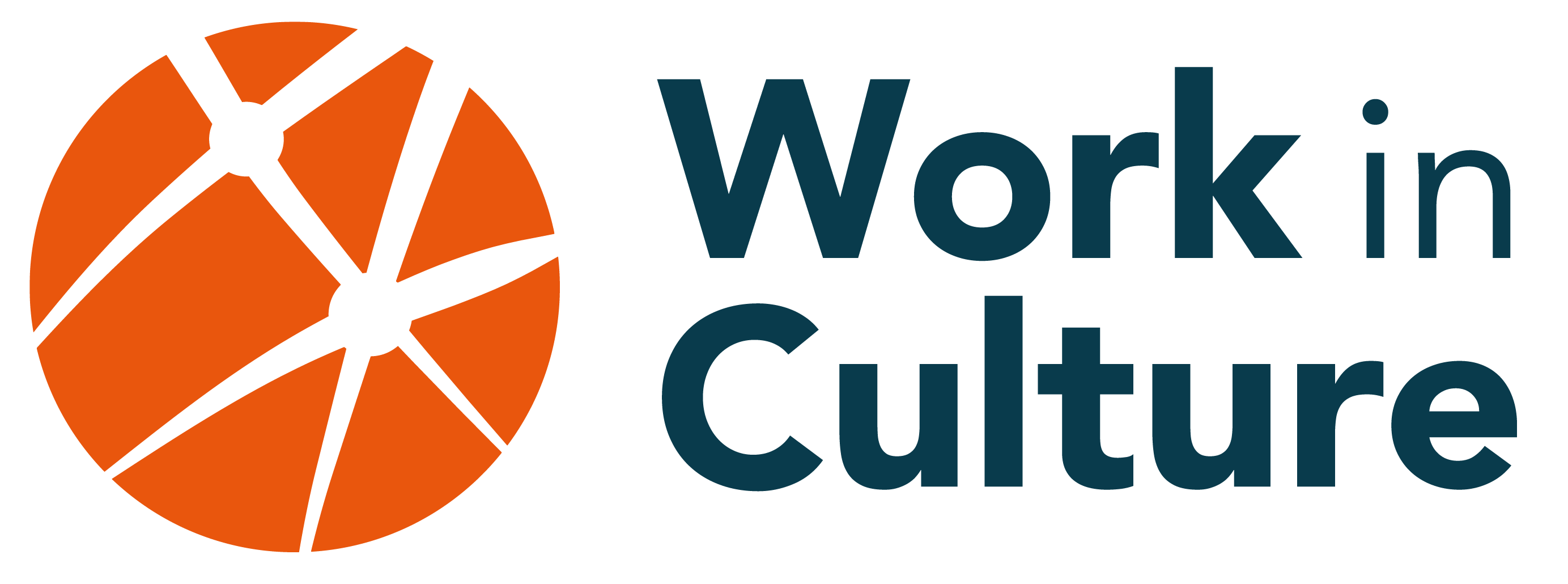
This blog is part of the Growing Creative Careers in Windsor & Region blog series. WorkInCulture worked closely with the Windsor-Essex Small Business & Entrepreneurship Centre and Arts Council Windsor & Region to develop and deliver Growing Creative Careers, a professional development training series for artists and arts workers/arts administrators in the Windsor-Essex region.
Maria Belenkova-Buford, a Russian-Canadian filmmaker based in Windsor, Ontario, embarked on a remarkable journey that fused her background in accounting with her passion for cinema. Maria also currently serves on the WorkInCulture board.
Maria’s passion extended to documentary filmmaking. Her work “Jenny’s Vision” was selected by CBC’s “Windsor Shorts” for the “Absolutely Canadian” series and screened at the “Uhvati Film” Festival in Serbia. Her documentary “Самородок – A Craftsman’s Journey,” inspired by her father’s story, received the ACHF grant and screened at the NHDoc Film Festival in the USA.
Maria Belenkova-Buford is a participant from the first cohort of our Growing Creative Careers: Windsor and Region program.
The first cohort was designed for arts professionals in the early or emerging stages of their career and covered training on articulating an arts or creative practice, CV writing, building online presence, financial management, grants and more.
Growing Creative Careers – Cohort 1 reflection
By Maria Belenkova-Buford
Cohort 1 focused on administrative and business skills development for emerging and early career artists and arts professionals (e.g. developing an artist statement/professional profile, planning, networking). Based on your experience, how do these skills help artists and arts workers pursue opportunities in their field?
In my experience, being artistically creative is critical but not enough to succeed in this day and age. It takes discipline, specific skills, and knowledge of the business world to grow professionally.
These are the three skills that have the most value for me:
- Networking and building relationships: the more connections the artist has, the more they can collaborate, find clients and promoters, participate in exhibitions etc. However, like anything, building that network requires patience, attention to details and willingness to go an extra mile for others.
- Time management: there are not a lot of artists who love administrative tasks. Yet, these tasks, if done consistently, free an artist’s time and alleviate the stress of being behind (when you know how much paperwork is waiting for you). Learning to manage your time is a crucial skill.
- Knowledge of how and where to look for resources: any problem is half solved if you know where to look for solutions. A bit of knowledge in various areas like legal agreements, licensing, intellectual property rights etc. gives a degree of assurance that we are on the right track finding the information. Networking comes in handy here — from fellow artists who already dealt with this problem to professionals who can take the lead.
What were some of the objectives you had going into our program, and how did it help you advance or address those objectives?
I had a couple of objectives going into the program:
First, I wanted to better understand the resources available locally and regionally, learn more about financial matters specific to the emerging artists (and to artists in general), improve my film director’s portfolio, and meet other artists and cultural workers.
Second, I was looking forward to an opportunity to collaborate and network with other artists. This was especially important as this cohort was established during COVID. Even the online community was a welcomed change!
Through the series of well-planned and enjoyable sessions I was learning immensely every week. I’ve made a lot of notes, and the online material provided was plentiful. I also discovered something new through discussions with presenters and fellow artists.
What is one major takeaway or piece of advice from the program (and/or your experience) that you’d like to share with others who are trying to advance their artistic careers/creative careers/creative projects?
There were a number takeaways, but if I had to give only one I would go with this one:
Keep asking questions!
Ask yourself and be clear about your own objectives (creative or business oriented).
Ask your peers for feedback, advice, and collaboration.
Ask professionals about anything that you can’t solve as it’s not your area of expertise.
Ask your friendly community Arts Council (or other organization supporting artists) to help you with any roadblock you are working to overcome at the moment.
Just ask and the answer will be there (eventually).
What are some of the needs you see when it comes to improving career development for artists, creative professionals, and/or arts and culture organizations in the Windsor-Essex Region?
We have many wonderful organizations in our community and their mandate is to support artists. However, funding of these organizations is not always enough to offer programs for the artists to improve their career development. At least, not on a regular basis.
I wish there was a mechanism to gather insights from artists and creative professionals, helping tailor programs and services offered by the organizations to better meet local needs.
I also think we would benefit greatly from establishing mentoring programs specific to creatives, with the focus on career development.
How did being a part of this cohort benefit your practice?
Equipped with knowledge and resources I was successful in applying for several grants.
I’ve met incredible people from various artistic spheres who were open to collaboration; over the last two years following the graduation from the Growing Creative Careers: Windsor & Region program I have collaborated with two artists from my cohort on two separate projects.
Overall, the program has exceeded my expectations and benefited my practice by allowing me to grow on many levels professionally and personally.
If you are an emerging artist, you can find downloadable templates provided to participants of the program to help you create your core documents to better navigate the administrative side of the arts:
- Project Timeline & budget chart
- Variable Income Planning
- Planning template
- SWOT Assessment
- Artist Bio
- Business Statement
- Elevator Pitch
To download these templates and learn more about the Growing Creative Careers: Windsor & Region program, please visit workinculture.ca/programs/growing-creative-careers-windsor-region.
